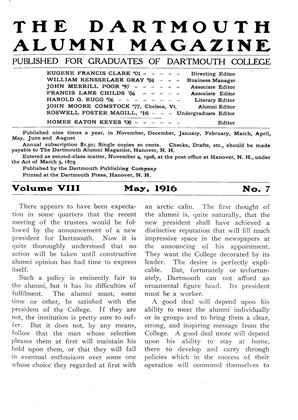The following letter written from the front to his parents by A. J. M. Tuck '14, now serving in the English army in France, will be of interest to readers of the MAGAZINE:
February 11th, 1916
DEAREST FAMILY:
I have been so very busy lately. As I told you, I am doing Brigade Machine Gun Officer for the Brigade now and the work is unending. I remember talking to Carola at Epsom about Officer commanding companies and platoons and she said in Egypt you only heard about Battalions. Out here now we only deal in Corps and Armies. Howard, the A. 1. Brigade Major we had, has now gone as General Staff Officer to 2nd Army. Some job!
On January 27th, the Kaiser's birthday the enemy were most offensive and launched a small attack on our left, which we smothered in very heavy machine gun fire, and the few who got in our trenches didn't return. We had 70 casualties in our Batt. alone, and now I must give you sad news. One shell killed three of our Officers. Dear old Jerry who joined the Batt. in September. When he was in the trenches he was a perfect Officer, unselfish, dutiful and fearless. It is impossible to realize that he has gone West. I wish you could write a line to his people, just Sir Stephen Penfold, Folkestone. We had been such pals out here. The other two were Miller, recently arrived, a nice boy, and Bob Home. The same shell got all three, just after they had extracted a Jock who had been buried under some sand bags brought down by another shell. Home was one of the four kept out of the attack in September.
Here is a typical day that I spend now. Get up at 5 a. m. Breakfast at 5.30. At 6 a. m. the General, Brigade Major and I ride off in the inky dark up the Bethune-Lenz road into Loos (the right of our present line). The General and Brigade Major cover about one third of the sector each day, when they leave me, and I carry on over the rest. (Grooms have taken the horses home.) Loos is the most be-shelled and desolate place imaginable, but usually healthy at 6 a. m. Then I carry on over the sector inspecting the 32 machine guns we now have. (I remember so well at Epsom, when I hoped to be one of six men who handle one machine gun, I little thought some day I should be responsible for 32 of them.) On my way I collect the intelligence reports and check anything remarkable, then I start back, stopping at the Divisional Observation Post on the way and handing in a report covering all those I have received, then back to Brigade Headquarters about 3 p. m. where I hand in a duplicate copy, and turn to my desk work, which consists of sending out orders for night firing for the machine "guns, reliefs, rationing, etc. Then make the intelligence map up to date. This work takes me to tea time, and then to dinner and about two and a half hours afterwards; bed before eleven always. Lunch I carry in my haversack. It is about the hardest work I have ever done, and I enjoy all of it sincerely.
"The First 100,000" I have read; it is very good. An exact history of what we are doing and have done. The author is in the Argyle and Sutherland Highlanders. He is at present Brigade Machine Gun Officer. They fought on our left in September. That Division came out in May and, up to September curious to say, had done less time in the trenches than we had. We have since held all the places he mentions, at different times since September, and every name means a volume to me. His reference to the machine gun officer, bombing officer, and trench mortar officer, are very clever and true. The Brigadier read them out loud at dinner, and roared over them. Nevertheless, there are many things he writes of, which I would not care to mention outside of a letter home. I am so tired. Good night all.
 View Full Issue
View Full Issue
More From This Issue
-
 Article
ArticleTHE DARTMOUTH SCIENTIFIC ASSOCIATION, ITS ORIGIN AND HISTORY
May 1916 By Charles F. Emerson -
 Article
ArticleTHE TRUSTEES' APRIL MEETING
May 1916 -
 Article
ArticleCALEB MILLS, EDUCATOR
May 1916 -
 Article
ArticleThere appears to have been expectation
May 1916 -
 Books
BooksFACULTY PUBLICATIONS
May 1916 -
 Class Notes
Class NotesCLASS OF 1859
May 1916








